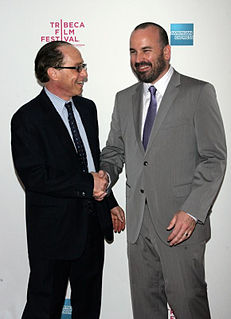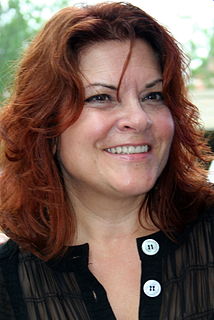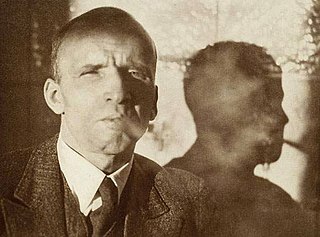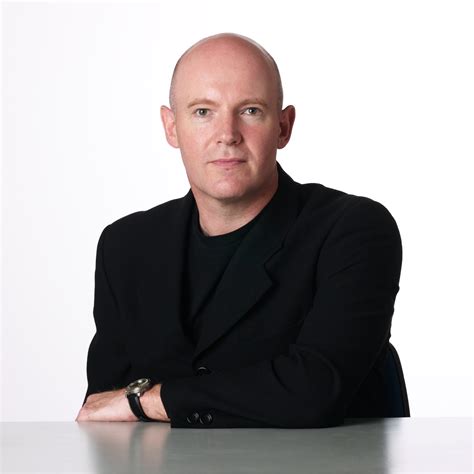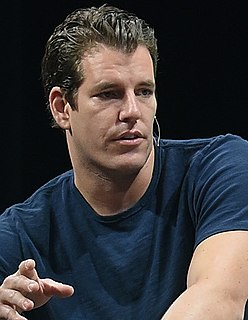Top 387 Linear Quotes & Sayings - Page 6
Explore popular Linear quotes.
Last updated on December 4, 2024.
At 42,000' in approximately level flight, a third cylinder was turned on. Acceleration was rapid and speed increased to .98 Mach. The needle of the machmeter fluctuated at this reading momentarily, then passed off the scale. Assuming that the off-scale reading remained linear, it is estimated that 1.05 Mach was attained at this time.
My own movement of thought is not meant to be a straight point-to-point, linear line of march, but horizontal exploration from one area of interest to another. There is no ultimate destination - no finish line to cross, no final conclusion to be reached. It's the way I feel about dancing - you move around a lot, not to get somewhere, but to be somewhere in time.
I think that people talk about radical life extensions as if it is just one linear kind of journey, when actually what's going to happen is we're going to radically expand our lives billions and billions of times in every way, in every dimension and so I'm looking forward to things I can't even imagine yet.
Like Thornton Wilder said, time is not a river, but rather a landscape that you step in and out of. I've always found that true of creative work, and I've heard so many songwriters and writers in general say the same thing... When you're going into the realms of your self and trying to tap into the mystery of this creative source, linear time kind of falls away.
Simplification seems to be the removal of objects for the goal of making a graphic as clean and uncluttered as possible. Whereas, with optimization, it feels like there's more intelligence in that. It maintains the usability, but tries to distill something down to its essence. But with some data-sets you have to be careful because, as with linear, print journalism, it's easy to shave off facts that don't quite fit the flow.
I was never very good at math and science, to be honest, so it's fun to play a character that is so scientific and mathematical, and whose brain functions at such a high pace. The biggest difference is that Maura is very linear in her thinking and very logical. I'm not quite like that. I'm much more laid back and not quite so type A. That's the big difference.
When I make music I try to be as honest as I can to how I experience the world. Like how you arrange a piece of music formally. I tend to observe a lot of chaos or whatever, the fragmentation and melancholy. That's the filter I synthesize my world view with. If I didn't formally have that chaos and it was really linear, it would make my skin crawl.
I realized that every second that I'm alive, the world cares less about me. It's just a very linear, downward progression. And it sounds cynical because you guys are young and you're full with life. I want you to understand - this is it. You have nothing to look forward to because you're peaking. If you're not having fun now, kill yourself. I don't mean that in a bad way, just - it's not worth it to go forward.
The relationship between art and a job is not quite linear, but I really love any and all manifestations of art, really respect any kind of artistic impulse, whether it's paintings and sculptures or really good filmmaking or music. I really see the relationships between these different mediums as very fluid.
Building your "dream life" is filled with things that can feel like the opposite of a dream:
Mistakes
Delays
Starting over
Failure
The building part is actually more of a rebuilding that is a continual process. The building is not linear in nature but far more interesting. You might start a creative dream, take the "next step", and find yourself completely bored, dissatisfied, or just not inspired.
I always liked creativity, whether it was to draw or sew - any creative assignment I was getting from school, or just on my own. I love people and behaviors, and I'm interested and fascinated by why we do what we do. And I wanted to be a therapist, to be honest. Maybe wirking in film combines the two worlds, in a not super-linear way, but it definitely feeds both my two passions.
Now I began to understand art as a kind of black box the reader enters. He enters in one state of mind and exits in another. The writer gets no points just because what's inside the box bears some linear resemblance to "real life" -- he can put whatever he wants in there. What's important is that something undeniable and nontrivial happens to the reader between entry and exit.
Hopping around time in a non-linear storytelling fashion (on 'Lost') allows you to bring back characters who are dead and, in some cases, buried. Now that time travel is the story itself, it opens up even more doors. So when an actor reads that they're getting killed off on the show, they're basically, like, 'Okay, but should I still bother to show up next week?'
The only education in grief that any of us ever gets is a crash course. Until Caroline had died I had belonged to that other world, the place of innocence, and linear expectations, where I thught grief was a simple, wrenching realm of sadness and longing that graduallu receded. What that definition left out was the body blow that loss inflicts, as well as the temporary madness, and a range of less straightforward emotions shocking in their intensity.
The first issue that compelled me was a very strange split between India being highly development scientifically (we were the third biggest scientific manpower in the world then) and yet at the same time struggling with amazing poverty. The linear equation that says that modern science equals progress and the reduction of poverty did not apply to India. It wasn't working.
To do justice to modern technology's rigid linear structure, to the lofty gridwork of cranes and bridges, to the dynamism of machines operating at one thousand horsepower - only photography is capable of that. What those who are attached to the painterly style regard as photography's defect, the mechanical reproduction of form - is just what makes it superior to all other means of expression.
I feel like the big twist shows are now off the table. I think Westworld was probably the last one to Trojan horse this idea of the young man in black. They were doing non-linear storytelling, but disguising it. Jonah Nolan and Lisa Joy have spoken openly about how they just didn't think people were going to figure it out that fast.
In 1990, if I wanted a pair of Calvin Klein jeans I had seen in a magazine, I'd head to the mall, sift through piles of inventory to find my size, try them on, ask the opinion of the often inexperienced sales associate, wait in line to check out, pay, and head home. The process was linear and ripe for improvement.
Wars make history seem deceptively simple. They provide clear turning points, easy distinctions.: before and after, winner and loser, right and wrong. True history, the past, is not like that. It isn't flat or linear. It has no outline. It is slippery, like liquid; infinite and unknowable, like space. And it is changeable: just when you think you see a pattern, perspective shifts, an alternate version is proffered, a long-forgotten memory resurfaces.
There is a tendency in my work toward minimalism, in terms of stripping away the unnecessary. I am seeking a tightly ordered gestalt, usually. I've always felt a strong affinity towards Mondrian's work. I understand the importance of those subtle planar and linear modulations he made in the course of building up the incredible visual tension in his work.
Generally I start writing when I have even the smallest idea of how a book is going to go, because the physical process of writing itself keeps the mind active and focused on the job at hand. Usually I write in about 5 drafts, but that simply means there are 5 definite times when I go in a linear fashion from the beginning to the end of the book.
Evidently, there are many great American writers. But sometimes it can feel as though American fiction is dominated by relatively linear narrative form, with a heavy emphasis on psychological realism. If you limit yourself to a certain kind of American literary fiction, it's easy to forget about the different kinds of books that are being written. You can forget to be ambitious, both as a reader and a writer.
Linear programming is viewed as a revolutionary development giving man the ability to state general objectives and to find, by means of the simplex method, optimal policy decisions for a broad class of practical decision problems of great complexity. In the real world, planning tends to be ad hoc because of the many special-interest groups with their multiple objectives.
What I remove from my writing is linear context. It's not really important to me, because it doesn't give me chills to see, "you flip the latch and the lock opens and then you can open the top of the chest and inside the chest is this." That doesn't give me chills, to think in that vein. So I've always kind of avoided it.
Why is it that Serge Lange's Linear Algebra, published by no less a Verlag than Springer, ostentatiously displays the sale of a few thousand copies over a period of fifteen years, while the same title by Seymour Lipschutz in the The Schaum's Outlines will be considered a failure unless it brings in a steady annual income from the sale of a few hundred thousand copies in twenty-six languages?
Every cell in our body, whether it's a bacterial cell or a human cell, has a genome. You can extract that genome - it's kind of like a linear tape - and you can read it by a variety of methods. Similarly, like a string of letters that you can read, you can also change it. You can write, you can edit it, and then you can put it back in the cell.
All your clear and pleasing sentences will fall apart if you don't keep remembering that writing is linear and sequential, that logic is the glue that holds it together, that tension must be maintained from one sentence to the next and from one paragraph to the next and from one section to the next, and that narrative - good old-fashioned storytelling - is what should pull your readers along without their noticing the tug.
The Anglo-American tradition is much more linear than the European tradition. If you think about writers like Borges, Calvino, Perec or Marquez, they're not bound in the same sort of way. They don't come out of the classic 19th-century novel, which is where all the problems start. 19th-century novels are fabulous and we should all read them, but we shouldn't write them.
Text is linear; it is black and white; it doesn't zoom around the page in 3-D; it isn't intelligent by itself; in fact, in terms of immediate reaction it is quite boring. I can't imagine a single preliterate was ever wowed at the first sight of text, and yet text has been the basis of arguably the most fundamental intellectual transformation of the human species. It and its subforms, such as algebra, have made science education for all a plausible goal.
I've always seen process of crafting as part of the thinking process. It really forms the gestation of the work. I'll get an idea; I want to express this idea, sometimes I'll start it, but during the process of making the object - if it's an object or a painting - it changes. It never goes in a linear progression from A to Zed. It's always this kind of circuitous, stumbling, groping in the dark kind of process of evolving.
Lots of people think, well, we're humans; we're the most intelligent and accomplished species; we're in charge. Bacteria may have a different outlook: more bacteria live and work in one linear centimeter of your lower colon than all the humans who have ever lived. That's what's going on in your digestive tract right now. Are we in charge, or are we simply hosts for bacteria? It all depends on your outlook.
Language is inherently not concerned with logic. As an expression of the psychological activities of humankind, it simply follows a linear process as it seeks actualisation. Moreover, it does not obey the objective concepts of time and space that belong to the physical world. When the discussion of time and space is imported into linguistic art from scientific aims and research methods, that linguistic art is entirely reduced to trifling pseudo-philosophical issues.
Writing is linear and sequential; Sentence B must follow Sentence A, and Sentence C must follow Sentence B, and eventually you get to Sentence Z. The hard part of writing isn't the writing; it's the thinking. You can solve most of your writing problems if you stop after every sentence and ask: What does the reader need to know next?
The inherent non-linearity of the digital allows for more input from others, including the subject and reader as collaborators. The top-down, bedtime-style story is of limited use. A non-linear narrative that allows for increased complexity and depth, and encourages both subject and reader to have greater involvement, will eventually emerge more fully from the digital environment. This, in a sense, is the more profound democratization of media.
You see, Dad, Professor McLuhan says that the environment that man creates becomes his medium for defining his role in it. The invention of type created linear, or sequential thought, separating thought from action. Now, with TV and folk singing, thought and action are closer and social involvement is greater. We again live in a village. Get it?
It's easy to fall into the trap of assuming that a new technology is very similar to its predecessors. A new technology is often perceived as the linear extension of the previous one, and this leads us to believe the new technology will fill the same roles - just a little faster or a little smaller or a little lighter.
For within livin structures defined by profit, by linear power, by institutional dehumanization, our feelings were not meant to survive. Kept around as unavoidable adjuncts or pleasant pastimes, our feelings were expected to kneel to thought as women were expected to kneel to men. But women have survived. As poets.
When Western people train the mind, the focus is generally on the left hemisphere of the cortex, which is the portion of the brainthat is concerned with words and numbers. We enhance the logical, bounded, linear functions of the mind. In the East, exercises of this sort are for the purpose of getting in tune with the unconscious--to get rid of boundaries, not to create them.
I think it's always interesting when you see a company start moving so quickly - it's like wow, incredible. When a company like Uber starts breaking away, it's not a linear thing. It's exponential. All of a sudden, the guy you know who threw $25,000 at Uber very early on - all the sudden, that $25,000 is $25 million.
An oral society develops both sides of your brain, and the utilization of your brain is more complete than in a linear education module. The written word limits your brain capability by immediately focusing on one area. You don't have any peripheral vision. It immediately divorces you from the environment.
Computers get better, faster than anything else ever. A child's PlayStation today is more powerful than a military supercomputer from 1996. But our brains are wired for a linear world. As a result, exponential trends take us by surprise. I used to teach my students that there are some things, you know, computers just aren't good at like driving a car through traffic.


